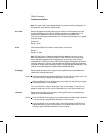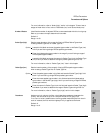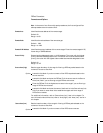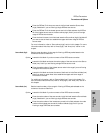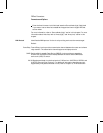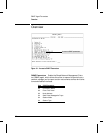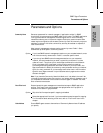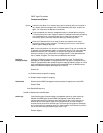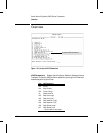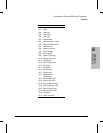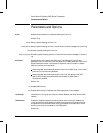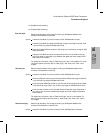
Options
Leave this field blank if no access of any type is allowed by either this console or
any remote network managers, even if other parameters are set to “enable” the
agent. You must enter an address to have access.
Enter the address of a network management station in dotted-decimal notation.
To have access to this router’s agent, a station’s IP address must match the setting
of this parameter and, in the case of queries (not receiving trap reports), the
community name it uses must match the setting of Community Name.
Enter the IP address 0.0.0.0 if you want to permit any network entity using
Community Name to query the agent. This setting is valid only for records with
Session type of Regular (queries).
Note: In the configuration of a record for a Session type of Trap, you must enter the
IP address of the management station to receive trap reports. If you leave the Node
Address field blank, as it is by default, no access of any type will be allowed by
either this console or any remote network managers, even if other parameters are
set to “enable” the agent. You must enter an address to have access.
Send Event
Messages As Traps
Enables or disables the generation of enterprise-specific traps. The Send Event
Messages As Traps parameter is displayed when the Trap option is selected for the
Session Type parameter. With enterprise-specific trapping enabled, some or all of the
event messages generated by the node are encapsulated within an SNMP protocol
data unit and sent as traps to SNMP application entities.
Default: No
Yes
Enables enterprise-specific trapping.
No
Disable enterprise-specific trapping.
Session Mode
Determines the SNMP management node’s access privileges to the router’s MIB.
Default: Read
Read
Reads MIB data only.
Read/Write
Reads and writes MIB data.
Session type
Identifies the types of data exchange—management queries or event reporting—
between the SNMP agent and the SNMP management nodes. Some network
manager applications provide their users both types of data; in this case you will
want to set one of the session types for this access record, and then configure
another access record with the other type. The event-reporting types of exchanges
are not queries by the managing node, so it doesn’t matter what community name is
set for the record using this session type, called “Trap”.
Default: Regular
SNMP Agent Parameters
Parameters and Options
9-4



